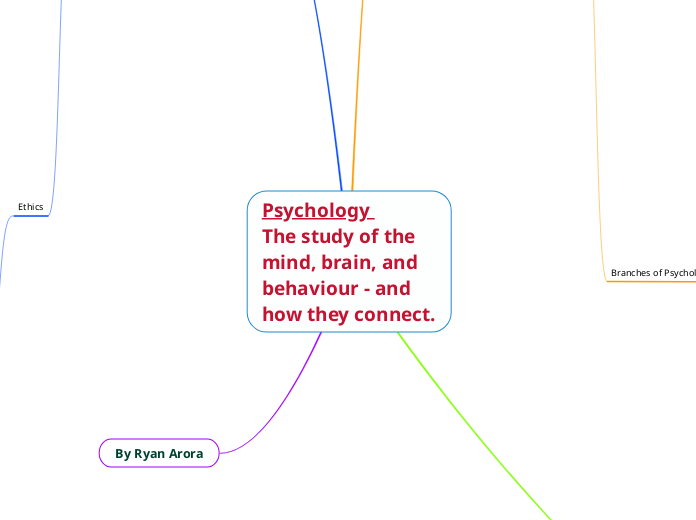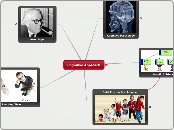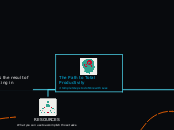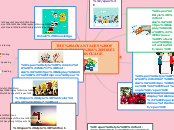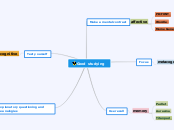Psychology
The study of the mind, brain, and behaviour - and how they connect.
By Ryan Arora
MENTAL HEALTH
Emotional and psychological wellbeing of a person. It affects how they think, feel, and act.
Ethics
Ethics are defined as the moral principles that rule one's behaviour in a psychological study, be it the one being tested or the conductor of said experiment. These ethics are important because the mental health of both parties can severely impact the outcome of the test. The 6 ethical standards shown above have been theorized in order to protect the best interests of those being tested.
Although there are ethical standards in place, there have been a handful of unethical experiments in history. An example is the Tuskegee Syphilis experiment. In this experiment, a test was conducted on 399 African-Americans with syphilis to see the after effects of what would happen if the disease went untreated, and if there was a difference in how the disease affected Caucasians vs. African-Americans. Over 100 died. This experiment was especially unethical because not only did innocent people die for research, it breached the ethical standards of right to withdraw and protection from harm due to the barbaric nature of this study,
Stress
Stress can be defined as a situation or experience that threatens one and causes them to act accordingly. As shown in the curve above (Yerkes-Dodson law), there is a healthy threshold for stress to achieve a beneficial output, but too much can be harmful and should thus be monitored. There are two types of stress, known as acute stress and chronic stress.
Chronic Stress is a threatening event that has no clear endpoint and a longer endpoint. An example of this would be suffering from suicidal thoughts.
Acute Stress is a threatening event that has a sooner endpoint and a short duration. An example of this would be studying/receiving marks for a test.
ASPD
Antisocial Personality Disorder (ASPD) is a mental health condition where one may not understand how to socialize, and have destructive behaviour towards others. They are often manipulative and reckless. They can turn into sociopaths or psychopaths.
Psychopaths are impulsive and erratic. They find much more trouble maintaining relationships with people. They lack empathy and are often delusional. They are more often mass murderers. An example of a fictional character who is a psychopath is The Joker from the movie The Dark Knight.
Sociopaths are extremely manipulative. They appear calm and controlled, and they take calculated risks in full awareness of what can happen. They are harder to catch, and they are more often serial killers. An example of a fictional character who is a sociopath is Patrick Bateman from the movie American Psycho.
THE BRAIN
Made up of small parts
within its tissue, the brain controls
all nervous activity.
Sleep/Melatonin
The pineal gland produces melatonin in the brain when it is time to sleep in a Circadian Rhythm, which means the brain recognizes that it is dark outside. By producing melatonin, the body gets tired and prepares for slumber. Melatonin is produced less in aging adults, and a lack of melatonin in anyone of any age can lead to sleep disorders. As well, earlier melatonin production due to shorter days in the winter is the leading cause for seasonal depression, due to one's lack of energy.
Personality
Human personality traits stem from the frontal lobe. Made up of many parts such as the prefrontal cortex and the frontal eye fields, the frontal lobe is key for the brain's higher function for things like awareness and consciousness. If damaged, the personality of the person can change severely, often times becoming more aggressive. The Phineas Gage incident where he was impaled through the frontal lobe is an example of aggression following a change in the frontal lobe's composition.
Memory/Memory Loss:
Memory and memory loss in humans all correlates to the condition of the hippocampus. Highlighted above, the hippocampus is small and is shaped like a sea horse. It is the most important part of the brain for memory. If damaged, it can cause amnesia. If deteriorating, it can cause dementia, and in a very bad scenario, it can cause Alzheimer's.
Deception/Lying:
Deception, or lying, is a complex behaviour displayed in the human brain. The region of the brain that is most active during lying is the prefrontal cortex (PFC), which is shown above. It is not to be confused with the frontal lobe, as the PFC is part of other parts which make up the frontal lobe. The PFC is studied commonly by forensic psychologists, especially during interrogations to determine the validity of what the suspect is saying.
Teenage Brain:
Teenagers have an under-developed cerebral cortex, which is a critical part of decision making. It is closely related to the limbic system shown above, which produces dopamine. Teenagers' limbic systems are matured and they produce much more dopamine due to the attraction of risk and lack of critical thinking shown in teenagers. This is why teenagers are attracted to dangerous activities such as nicotine.
THEORY
Basis of all psychological research and
rules that are founded upon this study.
Branches of Psychology
Humanistic
This study focuses on the individual and how they can learn to reach self-actualization (Maslow's Hierarchy of Needs, shown above)
Theorists:
Abraham Maslow
Carl Rogers
Psychoanalysis
This study focuses on connections between the conscious and unconscious mind, and the processing of life experiences.
Theorists:
Sigmund Freud
Carl Jung
Behavioural
This study focuses on human behaviour and how we learn.
Theorists:
Ivan Pavlov
B.F. Skinner
Cognitive
This study focuses on the mental processes of the brain, to explain behaviours, desires, and neurotic processes.
Theorists:
Elizabeth Loftus
Jean Piaget
Conditioning
Conditioning is a method used by people knowingly and unknowingly to learn to respond to different stimuli. There are three types of this kind of learning: operant conditioning, classical conditioning, and observant learning.
Observant Learning is the act of learning to pick up on traits/behaviour based on the experiences of other people around them.
Classical Conditioning is how an individual learns to transfer a natural response from one stimuli to another. Classical conditioning involves involuntary actions, such as dogs salivating, and introduces stimuli to make the response voluntary.
Operant Conditioning is a type of learning where responses to a situation depend on the consequences that follow the behaviour (good or bad). Unlike classical conditioning, operant conditioning involves voluntary actions, such as a rat pressing a button, and the rat is either rewarded for behaviour that is wanted with treats, or is reprimanded and shocked because the behaviour is unwanted.
